The Independent awards inaugural Rupert Cornwell Prize to Rachel Savage

The inaugural Rupert Cornwell Prize for Journalism has been won by Rachel Savage, a freelancer who has recently been working in West Africa. The annual award is aimed at younger journalists towards the start of their careers, and Ms Savage, 27, greatly impressed the panel of judges with her proposal for a series of features from the frozen north of Canada. She will explore the challenges and opportunities facing First Nation Canadians at a time of rapid economic and environmental change.
Ms Savage said: “Indigenous Canadians’ stories are rarely heard, and I hope to go some way to correcting that deficit. Statistically, First Nations people are suffering. Sixty per cent of children on First Nation reservations live in poverty; aboriginal women are three times more likely to experience violence than other Canadian women; and youth suicide rates are six times higher.
“However, the story of the land where the trees end and the tundra begins is not a straightforward one of destitution and despair. I am looking forward to reporting on some of the countless examples of humanity, resilience and creativity.”
The £5,000 prize is supported by The Independent, and will be awarded by the Rupert Cornwell Trust. On behalf of the judges and the trust, Cornwell’s widow Susan Cornwell, US congressional correspondent for Reuters, praised Rachel’s “originality and obvious passion for her trade”.
“She plainly has a bright future ahead of her and I am particularly pleased that the prize is to go to someone who aspires to the kind of reportage for which Rupert was so admired. She is an extremely worthy winner, and from a strong field. We were all impressed by her, and she emerged as the consensus choice.”
Ms Savage has contributed to The Economist, Management Today, The Times and the Daily Telegraph, among others.
In a competition which attracted a generally very high standard of entries, the judges also highly commended Lorenzo D’Agostino, Lemma Shehadi and Sam Lovett for their proposals, all of which showed “tremendous potential”.
The Rupert Cornwell Award was established in memory of the distinguished foreign correspondent and writer who died a year ago. It is designed to fund a suitable journalistic project in one of the broad regions Cornwell covered – North America, Europe and the former Soviet Union. It also commemorates one of the great foreign correspondents of modern times. He embodied the spirit of the newly launched Independent in 1986, and he remained one of its the wisest and most eloquent voices until his death last year, aged 71, still writing for the title. From his earliest reports for the Financial Times from Rome to chronicling the fall of the USSR to his last pieces on the Trump phenomenon, he remained a source of inspiration for all of his colleagues, and now for a new generation of writers as well.
Join our commenting forum
Join thought-provoking conversations, follow other Independent readers and see their replies
Comments
Bookmark popover
Removed from bookmarks